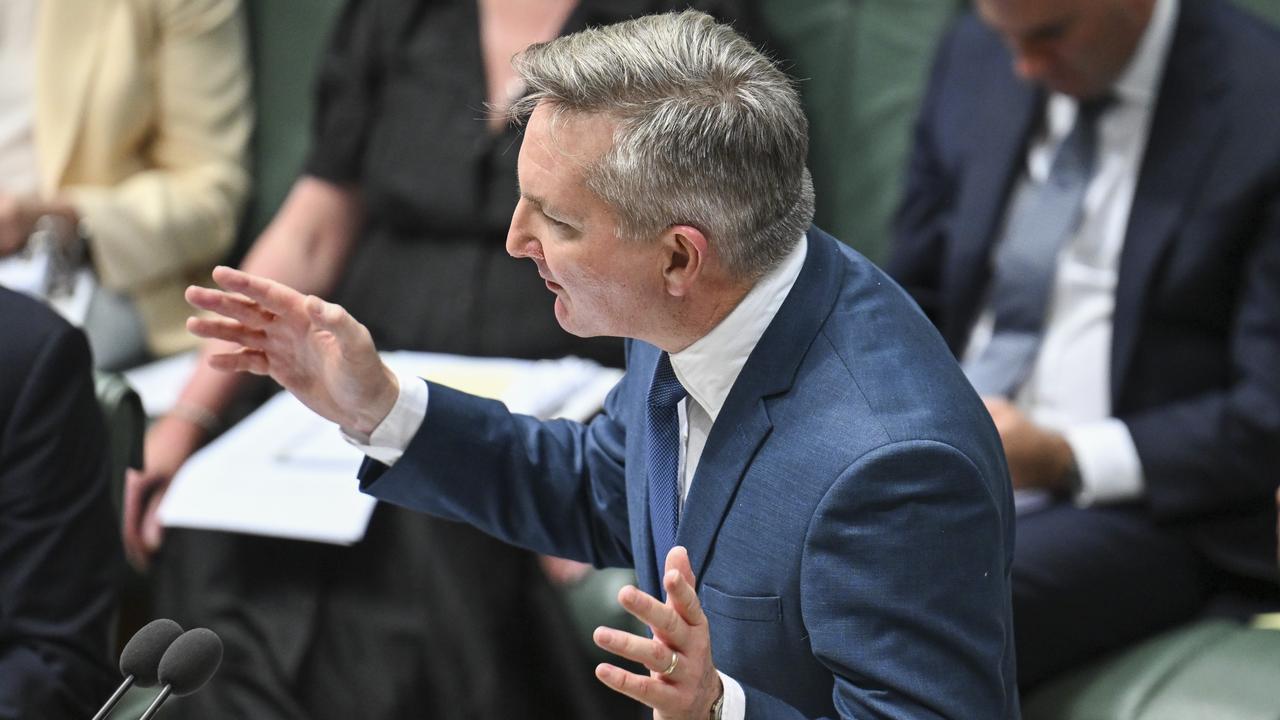Talking Point: Politicians must face proper scrutiny
The failure of those who report on politics to hold independent MP Kristie Johnston to account for her reckless use of parliamentary privilege is regrettable, writes GREG BARNS.

Opinion
Don't miss out on the headlines from Opinion. Followed categories will be added to My News.
KRISTIE Johnston, the independent MP for Clark in the state Parliament, has been getting a dream run from the media since she was elected earlier this year.
Not even when she was forced last week to front the parliament and deliver the most extraordinary apology for a reckless use of parliamentary privilege, was she put under scrutiny by those who report on state politics. The exception was the fearless and scrupulously fair David Killick in the Mercury.
The failure of the media to hold Ms Johnston to account is regrettable because parliamentary privilege, and the judicious use of it, is critical in a democracy. If it is abused and there is no public reporting of that abuse then the message is that it doesn’t matter.
Ms Johnston’s apology to the House of Assembly last Wednesday describes, in painful detail, her conduct. It involves serious unfounded and defamatory allegations against former Liberal minister Matthew Groom and his brother James about a golf course development. Ms Johnston made these allegations in Parliament on November 11.
But 13 days later she was forced into saying this: “The allegations were wrong and baseless. I deeply regret that I failed to make appropriate inquiries of my own to verify the allegations,” Ms Johnston told state parliament.” And then this admission: “I acknowledge that if I had without much effort I would have found them to be without foundation.”
Why didn’t Ms Johnston do the research? This is one question she should have been asked by the missing-in-action media.

But not only did Ms Johnston misuse parliamentary privilege, she then, despite being warned the allegations were baseless, repeated them in an interview. “I deeply regret ignoring that advice and now accept that by proceeding with the interview as I did, I defamed both Matthew Groom and James Groom, and seriously so. I also acknowledge that by conducting the interview I facilitated the republishing of baseless accusations by media outlets.” Breathtaking recklessness one might think. She now “deeply regret[s]” that course of action.
Ms Johnston now acknowledges Matthew Groom was in fact an “honest, decent and fair-minded person who has consistently demonstrated a strong commitment to act in the community interest”. James Groom, she said in her apology, was a man with a reputation for integrity.
Ms Johnston says she acknowledges making “a serious mistake” on November 11, 2021. Fortunately for her hip pocket, both “Matthew Groom and James Groom have been fair and gracious in responding to the completely unfounded allegations I subjected them to”. That she is not subject to defamation proceedings is, shall way say, good fortune.
This is not the first time Ms Johnston’s judgment about the use of parliamentary privilege has been questionable. In August, she used that privilege to make serious allegations against the erstwhile former Labor leader David O’Byrne. On that occasion, she did not repeat the allegations outside parliament.
As Nilay Patel observed in 2016, parliamentary privilege “is the right of a member of parliament to speak freely in parliament without fear of retribution. The privilege dates back to the British Bill of Rights in 1688 and is designed to ensure that members cannot be sued or prosecuted for anything they say in parliamentary proceedings. The scope of this privilege is complex and obscure and there are not many lawyers who can advise on it, yet it is a powerful weapon and a vehicle of oppression if abused,” Ms Patel wrote on Analysis and Policy Observatory, a Swinburne University-based online venture.
These cautionary words are consistent with House of Commons Committee on Procedure 4th Report (HC 1999) which said there is a clear distinction between an attack “on grounds of competence on a political level”, which would be unexceptionable, and attack at a personal level, which was objectionable. “We draw this distinction to members’ attention and agree that people should not make widespread personal attacks on each other under the guise of privilege,” the report concluded.

So, why is it that the Tasmanian political media, with the exception of the Mercury and David Killick, did not question Ms Johnston or comment on her conduct? If it had been a Gutwein government minister or a Labor MP you can bet the response would be different, one surmises.
It is dangerous for the media to let MPs off the hook because it looks like they judge them by different standards according to whether they are liked by the media. And, furthermore, parliamentary privilege is a critical institution that must not be abused no matter the profile of the MP.
Those who report on parliamentary politics have an obligation to report on abuses of privilege. As noted above, it is a privilege with deep historical roots, and must be exercised with judgment and with an eye to ensuring reputations and character are not besmirched.
Underwhelming, boring vision for our capital city
November 21, 2021
THE Macquarie Point Development Corporation, a taxpayer-funded property developer, and the University of Tasmania, also a taxpayer-funded property developer, which moonlights as a teaching institution, have something in common.
Both released plans for developments last week that were underwhelming, boring and bourgeois. And you, the taxpayers, paid for the marketing hype, replete with the usual mindless babble that populates the pages of property development marketing efforts.
Consider Macquarie Point. A site where the term “glacial pace of progress” as a concept is redefined. And when, after how many years, they finally unveil a use of the space, it is simply a suburban developer’s vision of a few apartments, some shops selling overpriced products, and sterile cafes. And could we know how much taxpayer funds will go to subsidising construction?
$100m Mac Point development to include accommodation, rooftop bar
‘Apartments for rich people’: Labor’s Macquarie Point jibe

The developer of the project on prime land is a Melbourne outfit called Milieu. A visit to their website will tell you they are designers of some aesthetically pleasing apartments and other buildings in inner Melbourne.
The images of the proposed Macquarie Point project, which this newspaper revealed last week, show something similar. According to the gushing announcement from the Macquarie Point Development Corporation: “Milieu’s $100m development will incorporate a range of uses, including apartments and short-stay accommodation, retail, and hospitality. The development will also be widely accessible to the public, including a rooftop bar and restaurant, a green roof with public open space, and provide 24/7 direct access, including disability access, from Macquarie Point through to the Cenotaph.”
In other words, essentially a suburban vision on a prime and historically important piece of the Hobart waterfront.
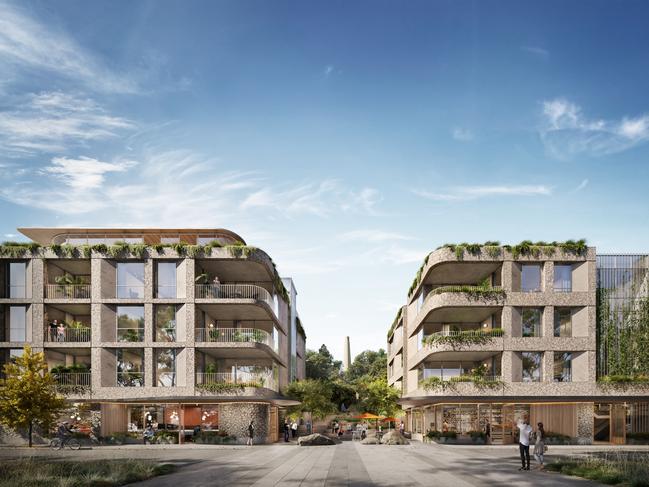
No doubt Milieu were working to a brief provided to them by the Macquarie Point bureaucrats, but is this really the best we can do? Particularly given there is no mention of affordable housing. Have no doubt, this will be an enclave for the bourgeoisie.
That this is the first major development on the Macquarie Point site speaks volumes about the modest ambitions of those who are charged with turning this area into something architecturally visionary, open and accessible, and which above all reflects Indigenous possession of land disrupted by an invasion over 200 years ago.
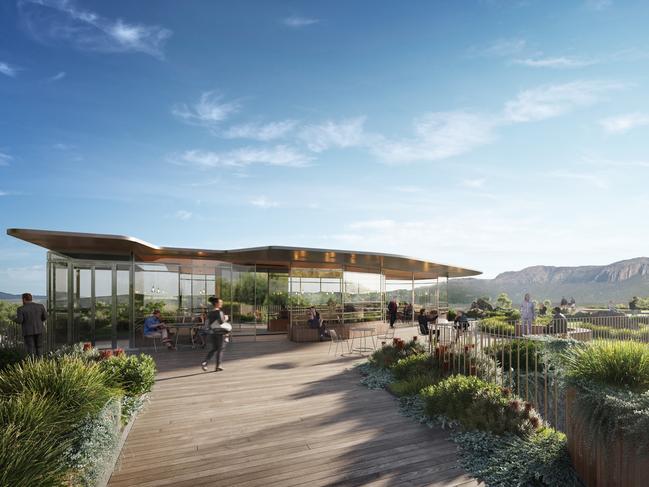
Compare the Macquarie Point ‘vision’ with that driven by Paul Keating, the former prime minister and a man who understands architecture, big visions, culture and Indigenous history.
Mr Keating chaired the Barangaroo authority in Sydney and as he said recently: “Barangaroo and its headland park have allowed people to reclaim the kilometre-long waterfront, sterilised by the maritime industry for 200 years and vandalised by the NSW Maritime Services Board in the 1950s with its aircraft carrier-like container wharf.”
It is now the “juxtaposition of the modern with the baroque naturalism of the foreshore park”. And having been there often, one can attest to the fact this is not hyperbole. It’s a big-picture vision for a city that is claiming its waterfront.
No such vision at Macquarie Point unfortunately. Just a provincial and timid expression, so typical of the ‘small town cheap’ attitude (to coin a phrase once used by a Canadian judge) mentality of this city.
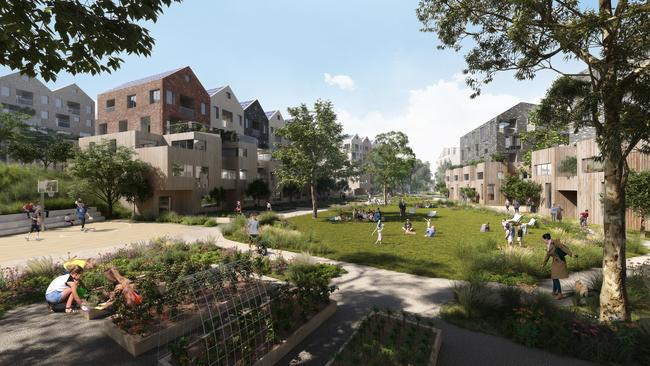
And so it goes similarly for that other property developer, the University of Tasmania.
Its move to downtown Hobart has precipitated a plan to turn its Sandy Bay campus into another suburban enclave with a few ‘hip’ features to lure the smart set into purchasing one or the properties that will be built on the site.
University of Tasmania reveals its ‘Reimagine Sandy Bay’ master plan
The glossy images produced by the University are, as with Macquarie Point, underwhelming. Again it’s just another suburban subdivision with a few trees, cycle paths, and the ubiquitous cafes thrown into the mix.
There is little discussion of the need for low-income housing other than references to what is weirdly termed “attainable housing”.

But what is so troubling about this development is the lack of accountability for the expenditure by the property company the University has established to build this extension of Sandy Bay. As always with the University of Tasmania, a publicly funded institution which is governed by an act of parliament, there is little or no capacity to scrutinise it’s expenditure.
Because this institution never has to attend the Tasmanian Parliament Estimates process, nor appear in any federal parliamentary sphere to account for its use of public funds, it is difficult to know how much consultants have been paid by the University to date to develop this subdivision.
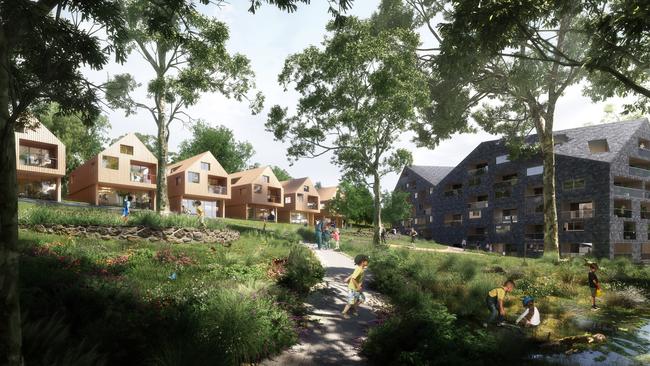
Macquarie Point and the University site in Sandy Bay are critical landholdings. The amount of taxpayer funds spent by those developing the sites, including a breakdown so each dollar can be accounted for, is critical.
And visionary smart thinking about the spaces is required. Sadly both fail at present on both scores.
Hobart barrister Greg Barns SC is a human rights lawyer who has advised federal and state Liberal governments


